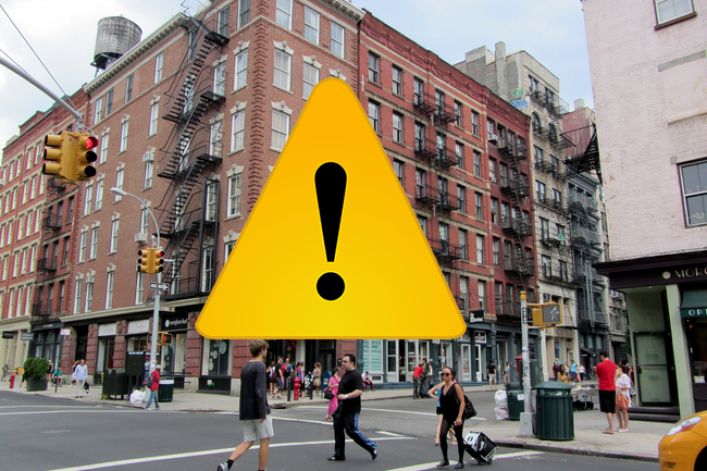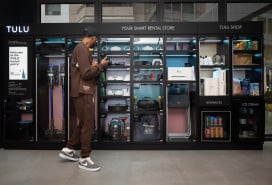5 apartment "dealbreakers" that are no big deal

Everyone goes into their apartment search with requirements—No more than two blocks from the L train! Outdoor space! A dishwasher!—but as the search wears on, most of us pare down our list of demands to "livable" and "in my price range." But knowing where to compromise and where to stand your ground can be trickier than you'd think, especially if you're trying to reach consensus with a bunch of roommates (or have never rented in the city before).
"Sometimes people make the wrong tradeoffs," says Mirador Real Estate agent Neeta Mulgaokar. "With my first apartment in New York, I ended up in a mouse-infested apartment with a half-refrigerator in the West Village. It’s funny, because when you first move to New York and you're on a budget, if you find something you can afford in a neighborhood like the West Village, you’ll end up with an apartment that has all your other red flags."
Below, five must-haves that may not necessarily need to be, as well as four that should stop a showing in its tracks:
WHEN TO COMPROMISE:
- The neighborhood. As Mulgaokar's experience indicates, unless you have unlimited funds, location isn't everything. If you're choosing between a terrible apartment in a dream neighborhood and something a little more livable and a little farther out, you're likely better off with the latter. "When you sacrifice everything else for the neighborhood, six months later, you'll want to break your lease," says Citi Habitats agent Jed Wilder. Be willing to broaden your search beyond your top choices, though at the same time, don't get lured by a low price tag into a neighborhood that'll destroy your social life. "Most people don't move to New York to live 12 stops into Queens," as broker Jeff Schleider, who owns and runs Miron Properties, puts it.
- The doorman. Sure, it's a nice perk, but doormen buildings come with high price tags, and aren't necessarily that much safer than non-manned ones. "It used to be a bigger deal, but now with the crime rates being so low, it's not as much of a concern as sometimes a renter's parents think it is," says Mulgaokar. "It's not a red flag if the building doesn't have a doorman—it's a red flag if there are no cameras and it's in the middle of a scary area." (For renters on a budget, it's time to get acquainted with your new best friend: the virtual doorman.)
- The laundry and elevator situation (or lack thereof). Yes, convenience is important, but put it this way: Is it worth a few hundred extra bucks a month to avoid walking up an extra flight of stairs, or lugging your laundry bag an extra half a block to the neighborhood laundromat? "These are things that often limit the playing field too much for people who come in with budgets," says Wilder. Especially in a city with endless laundromat options (and an ever-expanding roster of laundry delivery services), a basement laundry room isn't what you'd call the be-all and end-all. "I often find that even if we do find a client something with laundry, depending on the setup, they end up not using it anyway," says Citi Habitats agent Claire Marshall. "Especially in an area like the Upper East Side, where there’s a laundromat on every block."
- Being on the ground floor. Another once-common safety concern that's no longer as worrisome, thanks in part to the city's crime rates. Also, first-floor apartments have even undergone a trendy re-branding as "maisonettes" as of late. Still, there are times when you should be skeptical. "A first-floor apartment isn't a red flag for safety reasons, but it might be an issue if you're next to a bar," says Marshall. "If that's the case, your likelihood of getting mice and cockroaches increases significantly." To say nothing of the likely noise (and smell) intrusions.
- Closet space. "Closets in New York apartments are rarely massive or deep, so don't let that be a deciding factor," advises Keller Williams agent Daniel Karp. "As long as the apartment has space, a quick fix could be adding a cheap Ikea wardrobe or two—having the vision that someone else doesn't could land you a good deal."
WHEN TO RUN:
- Safety concerns of any kind. No, you don't necessarily need a doorman to be secure, but if anything about the apartment or the building sets your spidey senses tingling, trust your gut. "If there's anything that's cause for concern, whether it's a fire hazard or something else, that should not be negotiable," says Schleider. Broken security cameras (or no security cameras), poorly lit hallways, an unlocked front vestibule door and a broken buzzer should all be cause for concern.
- It's a railroad apartment—and you've got roommates. "I call this problem 'railroads with roommates,'" says Wilder. While the setup might be fine for a couple, Wilder says, "having to walk through one person's bedroom to get to the bathroom will get old." On top of that, these apartments often have separate doors in each room leading out into the hallway, which seems like a solution to the problem, but will likely grate on your nerves (and your roommates') sooner rather than later.
- Signs of shoddy maintenance. As with the beginning of a relationship, when a broker's showing you an apartment, the facade you see in the early stages is the most spiffed-up version you're ever going to get. So if something already seems sketchy, pay attention. This is true in the apartment itself, but also in common areas: Is there garbage in the hallway, an iffy smell, or any sign of pests whatsoever? "If you see it now, that's probably how the building is always kept," says Betsy Hoffman of Brennan Realty Services.
- Water damage. Few things are more of a headache—or more expensive to deal with—than water damage. And if it's serious enough, it can lead to mold, which can lead to health problems. All to say that you should take it seriously, and check for signs of water damage on the ceiling and walls during your walk-through. "If a leak happened before and the damage is obvious, there's a possibility it could happen again," says Karp. "Sometimes people focus on small things like water pressure on their walk through, but there are ways to work with that, as opposed to if the ceiling is cracking from a leak," adds Mulgaokar.
Related:
The 8 best websites for finding a no-fee apt in New York City
Moving to NYC? Here's a crash course in finding an apartment
8 questions you MUST ask before buying renters' insurance (sponsored)
20 questions: what to ask potential roommates to prove you're compatible
12 insider tips for renting in NYC
Found your dream rental, but need a guarantor? Time to call Insurent (sponsored)
























